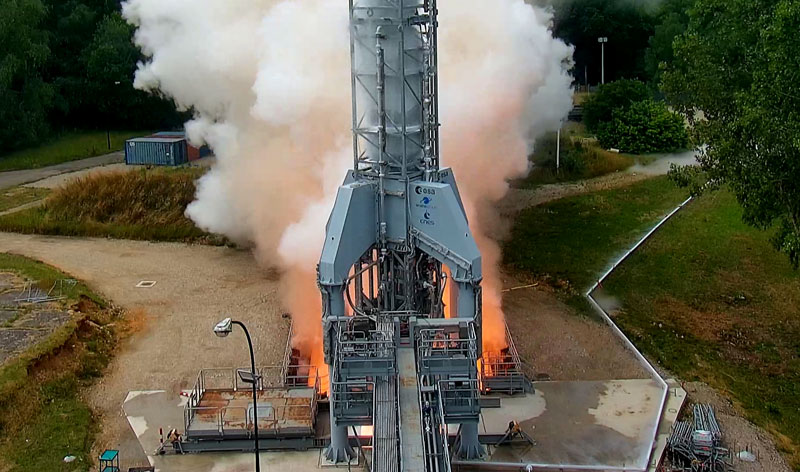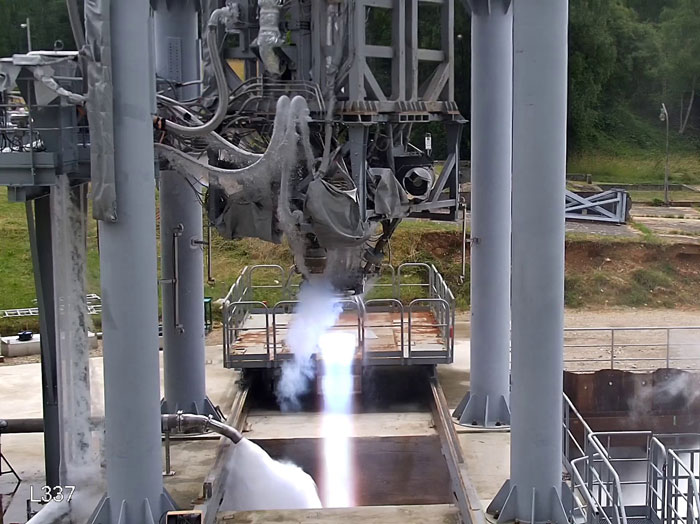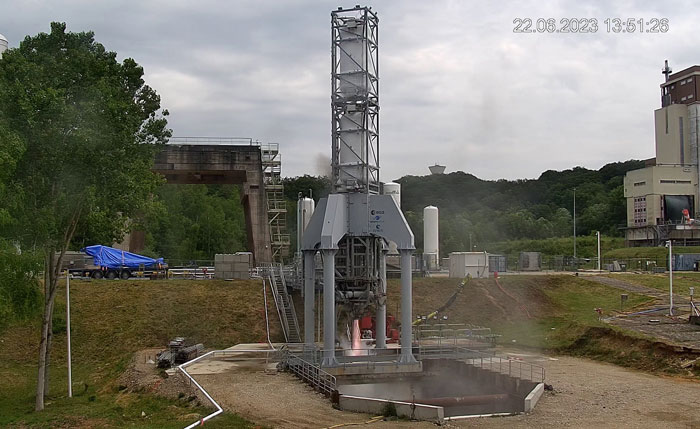
Europe has successfully completed the first hot-fire test of its reusable Prometheus rocket, a 12-second burn while integrated to the Themis first-stage demonstrator at the ArianeGroup site in Vernon, France.
Prometheus and Themis are components of the new ‘Ariane Next’ European launch program, which is focused on developing a fleet of reusable rockets to enter service in the 2030s.
The program is a joint effort between the European Space Agency (ESA) and the French Space Agency (CNES) with ArianeGroup as prime contractor.
The 100-tonne thrust Prometheus motor is powered by oxygen and methane, but to align with ArianeGroup’s environmental endeavors, the first hot-fire test on June 22, 2023, included a bio-methane fuel.
🔥We just successfully completed the first Hot Firing Test campaign of THEMIS a completely reusable space launcher stage in Vernon! https://t.co/LtTJ1xV9I1 @esa @cnes #RocketsMakers #SpaceEnablers #SIAE #lebourget #aerospace #ParisAirShow #Themis #ArianeGroup pic.twitter.com/8QHSTKu1EE
— ArianeGroup (@ArianeGroup) June 23, 2023
“Our firing was a crucial milestone on the journey to an operational product with all the test objectives in terms of operating points and duration achieved,” said Jérôme Breteau, Head of the Future Space Transportation systems at ESA.
“Further activities are planned to improve and complete the engine. For example, the engine configuration did not incorporate nozzle extension, and some combustion element manufacturing technologies being developed in parallel are not yet completed,” he added.
Ariane Next forms the building blocks of Europe’s ambitions to develop reusable launch vehicles beyond Ariane 5, Ariane 6 and Vega, with Prometheus and Themis among the first components to be developed and tested.

A key difference between Prometheus and the oxygen and hydrogen-powered Vulcain engine that powers Ariane 5 – and Vulcain 2.1 that will power the Ariane 6 – is that Prometheus will burn oxygen and methane.
The latter, which is liquid at a similar temperature to oxygen, is considered to be cheaper and an easier to handle option than hydrogen.
According to CNES, the new engine will be reusable up to five times and can deliver variable thrusts of up to 100 tonnes.
Though it will provide lower thrust than the Vulcain 2.1, which delivers 130 tonnes in a vacuum, the methane fuel component is six times denser than hydrogen and will enable more ‘compact’ rocket stages that are easier to recover.
The re-ignitable baseline design of Prometheus makes it suitable for core, booster and upper-stage applications. It could also serve as a precursor for Vulcain 2.1 improvements.
According to CNES, Prometheus will offer significant economies by reducing production costs tenfold with respect to the Vulcain engine – which has a unit cost of one million euros – thanks to new architecture, extensive use of 3D printing and a production rate of 50 engines per year.
Prometheus engine testing is scheduled to continue at the end of this year at the German Aerospace Center (DLR) test bench in Lampoldshausen, Germany.
Later in the testing schedule a combined Prometheus engine and Themis stage will attempt a series of ‘hop-tests’, lifting a few meters above the ground to check flight and landing capability.

ESA began developing its Themis reusable rocket stage in December 2020 under a contract with ArianeGroup for €33 million and says its aim is to complete tests early in the development cycle through an “agile and cost-driven” approach.
According to ESA, the ‘Themis Initial Phase’ follows a project timeline from 2020 to 2025 but while Themis completed tanking tests in December 2021, the latest hot-fire test was slightly behind the planned schedule.
The next test campaign for Themis is in Sweden and will be part of a European Union (EU) Horizon Europe program called SALTO (reusable strategic space launcher technologies and operations).
ArianeGroup was selected by the EU in July 2022 to oversee both the SALTO project and the ENLIGHTEN (European iNitiative for Low cost, Innovative & Green High Thrust Engine) project, which are designed to develop and produce reusable engines following on from Prometheus.
ESA views the reusability of rocket stages as a key method of reducing the environmental impacts of the launch industry and, while there is still nearly a decade until Ariane Next vehicles enter service, the technology is expected to provide Europe with a competitive edge for reusable options.
